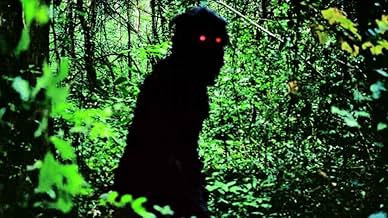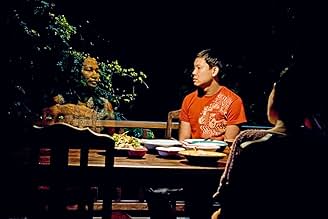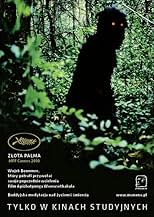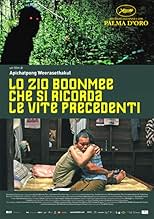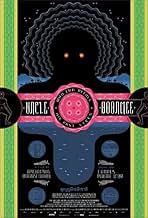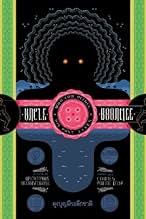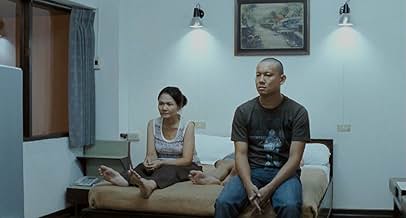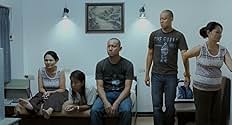Uncle Boonmee erinnert sich an seine früheren Leben
Originaltitel: Loong Boonmee raleuk chat
IMDb-BEWERTUNG
6,7/10
18.489
IHRE BEWERTUNG
Ein Mann, der an einer Nierenerkrankung sterben wird, verbringt seine letzten, düsteren Tage in einem Farmhaus im Norden Thailands mit seiner Familie, zu der auch der Geist seiner verstorben... Alles lesenEin Mann, der an einer Nierenerkrankung sterben wird, verbringt seine letzten, düsteren Tage in einem Farmhaus im Norden Thailands mit seiner Familie, zu der auch der Geist seiner verstorbenen Frau und sein Sohn in Gestalt eines Waldgeistes gehören.Ein Mann, der an einer Nierenerkrankung sterben wird, verbringt seine letzten, düsteren Tage in einem Farmhaus im Norden Thailands mit seiner Familie, zu der auch der Geist seiner verstorbenen Frau und sein Sohn in Gestalt eines Waldgeistes gehören.
- Regie
- Drehbuch
- Hauptbesetzung
- Auszeichnungen
- 11 Gewinne & 25 Nominierungen insgesamt
Kanokporn Tongaram
- Roong
- (as Kanokporn Thongaram)
- …
Empfohlene Bewertungen
I'll be frank. Whether or not you enjoy this movie will depend largely on whether or not you are a die hard film buff or a casual movie goer looking for a story. If you are the later, then aside from the eerie sight of the red eyed Monkey Spirits, you will come away disappointed.
That said, there is much in Uncle Boonmee to like, but like the Buddhist aesthetic the film is steeped in, you have to be ready for it. Because this is one film that demands a lot of patience of the viewer.
Set in rural Isan Province, Thailand, the story follows the last days of a well to-do farmer, the titular Boonmee, who is dying of a terminal illness. Like all dying men, Boonmee can't help but wax philosophic, both on the nature of death itself and on his own past mistakes, and one night while eating with his family is suddenly and abruptly joined by two spirits, the first of his dead wife, Huay, the second that of his missing son, Boonsong, who has inexplicably been transformed into a black monkey. Anyone even remotely familiar with the prior work of Director Weerasethakul (try saying that with a mouthful of marbles), particularly Tropical Malady, will know that such surrealism is a common theme in his films, with its signature mix of traditional Thai Buddhism and animist lore. As in Tropical Malady, the day belongs to the living and the mundane, but night brings on ghosts, animal spirits, the shades of ancestors, and the inner musings and anxieties of Weerasethakul's characters.
The film itself feels much like a Buddhist temple; with its long uninterrupted and unadorned shots, and its devotion to capturing trivial moments, it is not so much a vehicle for storytelling as contemplation. The last film to be shot with celluloid as opposed to digital, it is the director's self-admitted funerary ode to a dying medium.
That said, there is much in Uncle Boonmee to like, but like the Buddhist aesthetic the film is steeped in, you have to be ready for it. Because this is one film that demands a lot of patience of the viewer.
Set in rural Isan Province, Thailand, the story follows the last days of a well to-do farmer, the titular Boonmee, who is dying of a terminal illness. Like all dying men, Boonmee can't help but wax philosophic, both on the nature of death itself and on his own past mistakes, and one night while eating with his family is suddenly and abruptly joined by two spirits, the first of his dead wife, Huay, the second that of his missing son, Boonsong, who has inexplicably been transformed into a black monkey. Anyone even remotely familiar with the prior work of Director Weerasethakul (try saying that with a mouthful of marbles), particularly Tropical Malady, will know that such surrealism is a common theme in his films, with its signature mix of traditional Thai Buddhism and animist lore. As in Tropical Malady, the day belongs to the living and the mundane, but night brings on ghosts, animal spirits, the shades of ancestors, and the inner musings and anxieties of Weerasethakul's characters.
The film itself feels much like a Buddhist temple; with its long uninterrupted and unadorned shots, and its devotion to capturing trivial moments, it is not so much a vehicle for storytelling as contemplation. The last film to be shot with celluloid as opposed to digital, it is the director's self-admitted funerary ode to a dying medium.
This movie is meditation, a state of concentration. I only wish I wasn't tired when I saw it last night because my concentration waned, I could feel the movie slipping between my fingers and trying to wilfully sustain the experience can't work. This is a Buddhist film, but it's Thai Buddhist (the form they practice in Thailand came from Sri Lanka and is from the earliest strata of Buddhism), it's spiritual but it's not esoteric in the manner of the Tibetans, ancient but not arcane. It's not Buddhist because Boonmee may or may not be recalling on his deathbed his past and future lives, or because there are ghosts and demons and a talking catfish, this is colorful lore, the illusory flowers of mind. It's Buddhist because it's aware of the moment. Not so strangely, it's the fantastical bits that seem to make the film watchable for most people, yet if we come to this film to satisfy our need for something to happen, we break the spell. The spell here for me is the awareness of life as is, the clear vision of a heaven in the present world.
Here's a camera that doesn't describe a world, it allows it to emerge in its own time. Sometimes this tests my patience but I appreciate that it doesn't make amends and concessions. Cessation, stillness of mind, true perception, these are all vital and desirable here, and they can only happen in their own time, they can't be forced. I appreciate that and I appreciate the limitations of my own viewing. In those moments that my eyes and the movie adjust, I am blissful. Two moments exemplify this, the one is a table out in the verandah by night, insects buzzing around a light and everything is quiet, this is the summer night for me. The other is Uncle Boonmee lying down on a bed in his honeykeeping shed, it's noon and crickets are humming from the trees, this is the summer day. It reminds me of the remembrance of spring in Kiarostami's The Wind Will Carry Us.
The finale is rather interesting, despite the above. A lot of viewers seem to regard it as Weeresethakul's comment on the alienation fostered by the niceties of modern society. It is its own comment on the place of Buddhism in one such society, where the garments of the monk mean nothing, but instead of inferring that a day's hard work out in the open is preferable to watching TV Weeresethakul could have not made a movie to begin with (that calls for us to sit alone from one another in a dark room where flickering lights are projected).
But I don't think that such a simple conclusion was what was intended. I see vision that wants to encompass the world of ambiguities. The family may be sitting in the silent, staring at a box, but I got the sense of quiet warmth coming from the simple togetherness, a certain soothing affect that is possible only in people who can sit together without a need for words. Who can relax simply in the presence of each other.
This is valuable work, and I believe it will be cherished by viewers who feel the chakras of cinema should be purified and set ablaze now and then.
Here's a camera that doesn't describe a world, it allows it to emerge in its own time. Sometimes this tests my patience but I appreciate that it doesn't make amends and concessions. Cessation, stillness of mind, true perception, these are all vital and desirable here, and they can only happen in their own time, they can't be forced. I appreciate that and I appreciate the limitations of my own viewing. In those moments that my eyes and the movie adjust, I am blissful. Two moments exemplify this, the one is a table out in the verandah by night, insects buzzing around a light and everything is quiet, this is the summer night for me. The other is Uncle Boonmee lying down on a bed in his honeykeeping shed, it's noon and crickets are humming from the trees, this is the summer day. It reminds me of the remembrance of spring in Kiarostami's The Wind Will Carry Us.
The finale is rather interesting, despite the above. A lot of viewers seem to regard it as Weeresethakul's comment on the alienation fostered by the niceties of modern society. It is its own comment on the place of Buddhism in one such society, where the garments of the monk mean nothing, but instead of inferring that a day's hard work out in the open is preferable to watching TV Weeresethakul could have not made a movie to begin with (that calls for us to sit alone from one another in a dark room where flickering lights are projected).
But I don't think that such a simple conclusion was what was intended. I see vision that wants to encompass the world of ambiguities. The family may be sitting in the silent, staring at a box, but I got the sense of quiet warmth coming from the simple togetherness, a certain soothing affect that is possible only in people who can sit together without a need for words. Who can relax simply in the presence of each other.
This is valuable work, and I believe it will be cherished by viewers who feel the chakras of cinema should be purified and set ablaze now and then.
I really do wish I could like this. As it is, I think it has some dazzling sequences, and some really atmospheric and hypnotizing scenes. For the most part though, it didn't amount to much for me, and that's because I was just really bored by a lot of it. This really just comes down to whether one is hypnotized or bored by it, and unfortunately for me it was the latter. That doesn't mean that it's an awful film, it has way too much originality in what I saw to label it as such (and whether it has anything to really say is anyone's guess). Still, I wouldn't recommend this to most people, simply because it's so hard to get into. Not recommended.
In order to appreciates the film, you have to understand that this movie is not just a normal film where you can expects classical narrative and plot. the directer not only have Buddhism as a philosophical point of view but he also put a little bit of Thai historical and political aspects in to the film.
In my opinion, the theme of this film is the man's struggle from human condition and transformation.
here are some few points I'd like to make concerning the film:
1. Man and Illusion
Before humankind, there was nature, which is pure and true. there are trees and wind and animals and so on. then there are man, which is basically another living specie. both animal and human have the same drive (sex, food, shelter etc.) the only different between man and animal is the ability to understand "sign" (read semiotic for more understanding) thus, human being created language, painting and symbol and so on. in other word, because our brain can perceived sign, so we can created ART. Art was created by man since the days of the cave man i.e. cave painting in Lascaux, France. (did you noticed that there are also cave paintings in the film?)
Man are proud that we are the only specie that can create and appreciate art, but what we didn't realized is that we are also the only specie that have the ability the created the illusion/lie/falsehood. Because of evolution, our unique brain can store memories and emotion, mix it up, and then created stuffs from it. because of this, the more time pass, the more we are far away from the truth; culture, law, politic, social status etc. are all MAN-MADE ILLUSION
2. Illusion of Dualism
It's seems like our perceived reality of "duality in nature" is embedded in our brain. we separated things into yin/yang mentality: day/night, good/bad, man/woman, live/death. one scene in particular shows how Boonmee kill the worms in his tamarind tree because "it's pest". then the next scene he show his sister the bee hive and seems very protective of it (he explain to his sister to avoid the larvae area on the plate). When he told his sister that his condition is the result of his karma from killing COMMUNIST and PEST, his sister replied "it's alright because you have good intention". When did killing other being can become good intention? Aren't communist human too? Aren't pests and bees are both insects?
3. The role of photography/Film, Memories, and Reality
Roland Barthes, in his book "Camera Lucinda", explained that a picture creates a falseness in the illusion of 'what is', where 'what was' would be a more accurate description. We can see a lot of scene involved photography; from the photos Boonmee shows to his dead wife as a proof of her funeral, the obsession of his son before he became a monkey, the final scene which Boonmee told the story about his dream etc. (this is an important scene, we will talk about it later)
4. In the playground, we created the rules, then we fought each other
In the film, we see peoples who of separated by this so-called man-made illusion, for example, different nationalities and spoken languages (Thai vs Laos), (Laos vs French) (Isan vs. Central Thai) etc. If you know little bit about Thai history, you will understand that the director also talk about the official vs the people / communism vs democracy(?).
in the final scene where Boonmee told the story about his dream, we see people wearing uniform. They are obviously appointed as "Soldier/Army". Then in the next photo we saw these soldiers captured the Monkeys Ghost. If you watch the film until this point, by now you should realized that the Monkey ghost is the allegory of the Communist.
then in the next photo, we saw that the soldier now taking their clothes off and play other kind of war game (throwing rock). The most funny thing is in the last photo, we saw 2 circles draw on the ground. In my opinion, the director suggest that countries, border dispute and war are nothing but a child's game.
5. Jāti: literally birth, but life is understood as starting at conception
the word "ชาติ" in Thai word derived from Sanskrit "Jāti", when translated to English it simply means "live". hence the name of the film "Uncle Boonmee who can recall his past lives" but in fact, the word Jati is the term in Buddhism which is not simply translate as "live" but have a lot more profound meaning.
By the way, I have the same feeling watching this film and Kubrick's 2001: Space Odyssey. Maybe because it also dealt with the theme of human condition and transformation, but this film is from the Eastern Philosophy point of view, of course.
In my opinion, the theme of this film is the man's struggle from human condition and transformation.
here are some few points I'd like to make concerning the film:
1. Man and Illusion
Before humankind, there was nature, which is pure and true. there are trees and wind and animals and so on. then there are man, which is basically another living specie. both animal and human have the same drive (sex, food, shelter etc.) the only different between man and animal is the ability to understand "sign" (read semiotic for more understanding) thus, human being created language, painting and symbol and so on. in other word, because our brain can perceived sign, so we can created ART. Art was created by man since the days of the cave man i.e. cave painting in Lascaux, France. (did you noticed that there are also cave paintings in the film?)
Man are proud that we are the only specie that can create and appreciate art, but what we didn't realized is that we are also the only specie that have the ability the created the illusion/lie/falsehood. Because of evolution, our unique brain can store memories and emotion, mix it up, and then created stuffs from it. because of this, the more time pass, the more we are far away from the truth; culture, law, politic, social status etc. are all MAN-MADE ILLUSION
2. Illusion of Dualism
It's seems like our perceived reality of "duality in nature" is embedded in our brain. we separated things into yin/yang mentality: day/night, good/bad, man/woman, live/death. one scene in particular shows how Boonmee kill the worms in his tamarind tree because "it's pest". then the next scene he show his sister the bee hive and seems very protective of it (he explain to his sister to avoid the larvae area on the plate). When he told his sister that his condition is the result of his karma from killing COMMUNIST and PEST, his sister replied "it's alright because you have good intention". When did killing other being can become good intention? Aren't communist human too? Aren't pests and bees are both insects?
3. The role of photography/Film, Memories, and Reality
Roland Barthes, in his book "Camera Lucinda", explained that a picture creates a falseness in the illusion of 'what is', where 'what was' would be a more accurate description. We can see a lot of scene involved photography; from the photos Boonmee shows to his dead wife as a proof of her funeral, the obsession of his son before he became a monkey, the final scene which Boonmee told the story about his dream etc. (this is an important scene, we will talk about it later)
4. In the playground, we created the rules, then we fought each other
In the film, we see peoples who of separated by this so-called man-made illusion, for example, different nationalities and spoken languages (Thai vs Laos), (Laos vs French) (Isan vs. Central Thai) etc. If you know little bit about Thai history, you will understand that the director also talk about the official vs the people / communism vs democracy(?).
in the final scene where Boonmee told the story about his dream, we see people wearing uniform. They are obviously appointed as "Soldier/Army". Then in the next photo we saw these soldiers captured the Monkeys Ghost. If you watch the film until this point, by now you should realized that the Monkey ghost is the allegory of the Communist.
then in the next photo, we saw that the soldier now taking their clothes off and play other kind of war game (throwing rock). The most funny thing is in the last photo, we saw 2 circles draw on the ground. In my opinion, the director suggest that countries, border dispute and war are nothing but a child's game.
5. Jāti: literally birth, but life is understood as starting at conception
the word "ชาติ" in Thai word derived from Sanskrit "Jāti", when translated to English it simply means "live". hence the name of the film "Uncle Boonmee who can recall his past lives" but in fact, the word Jati is the term in Buddhism which is not simply translate as "live" but have a lot more profound meaning.
By the way, I have the same feeling watching this film and Kubrick's 2001: Space Odyssey. Maybe because it also dealt with the theme of human condition and transformation, but this film is from the Eastern Philosophy point of view, of course.
In a spirit haunted primordial jungle a joyful man is quietly, harmlessly dying, though there is never less than a smile on his face.
The phases of his life play out before him. He is a farmer, a soldier, teller of myths, a husband, a father, an uncle. All these things quietly take their place in the narrative until the time when he must enter the underworld and pass on, guided by those who love him, both living and dead.
As Boonmee reflects on his life the arc of Thailand plays out as well. From contemplative agrarian past, through the time of fables, to the war with the communist and on into the disaffected, modernist future where we see ourselves seeing ourselves seeing ourselves.
All told with a minimal amount of fuss and effects, sewn together with threads of human intimacy, small gestures, a little sly humor and an over all meditative, knowing, measured rhythm.
There was another movie out last year that claimed it was about dreams... an American film. It made a lot of money but felt false and boisterous. Nothing about it felt like dreaming to me at all. This movie IS a dream. Everything about it feels like a dream. The difference between the two is the difference between spectacle and ritual. Uncle Boonmee is ritualized cinema in its purest form, ancient in its wisdom and avant-garde in its form.
The phases of his life play out before him. He is a farmer, a soldier, teller of myths, a husband, a father, an uncle. All these things quietly take their place in the narrative until the time when he must enter the underworld and pass on, guided by those who love him, both living and dead.
As Boonmee reflects on his life the arc of Thailand plays out as well. From contemplative agrarian past, through the time of fables, to the war with the communist and on into the disaffected, modernist future where we see ourselves seeing ourselves seeing ourselves.
All told with a minimal amount of fuss and effects, sewn together with threads of human intimacy, small gestures, a little sly humor and an over all meditative, knowing, measured rhythm.
There was another movie out last year that claimed it was about dreams... an American film. It made a lot of money but felt false and boisterous. Nothing about it felt like dreaming to me at all. This movie IS a dream. Everything about it feels like a dream. The difference between the two is the difference between spectacle and ritual. Uncle Boonmee is ritualized cinema in its purest form, ancient in its wisdom and avant-garde in its form.
Wusstest du schon
- WissenswertesShot on 16mm film rather than digital. Director Apichatpong Weerasethakul wanted to film in this format as the film is all about dying traditions.
- PatzerThe first time a ghost appears, during dinner, the nephew passes the ghost a glass of water. You can see the ghost image superimposed over the nephew's arm when he places the glass of water on the table.
- VerbindungenFeatured in At the Movies: Cannes Film Festival 2010 (2010)
Top-Auswahl
Melde dich zum Bewerten an und greife auf die Watchlist für personalisierte Empfehlungen zu.
- How long is Uncle Boonmee Who Can Recall His Past Lives?Powered by Alexa
Details
- Erscheinungsdatum
- Herkunftsländer
- Offizielle Standorte
- Sprachen
- Auch bekannt als
- Uncle Boonmee Who Can Recall His Past Lives
- Drehorte
- Produktionsfirmen
- Weitere beteiligte Unternehmen bei IMDbPro anzeigen
Box Office
- Bruttoertrag in den USA und Kanada
- 184.292 $
- Eröffnungswochenende in den USA und in Kanada
- 23.540 $
- 6. März 2011
- Weltweiter Bruttoertrag
- 1.214.424 $
- Laufzeit
- 1 Std. 54 Min.(114 min)
- Farbe
- Sound-Mix
- Seitenverhältnis
- 1.85 : 1
Zu dieser Seite beitragen
Bearbeitung vorschlagen oder fehlenden Inhalt hinzufügen


